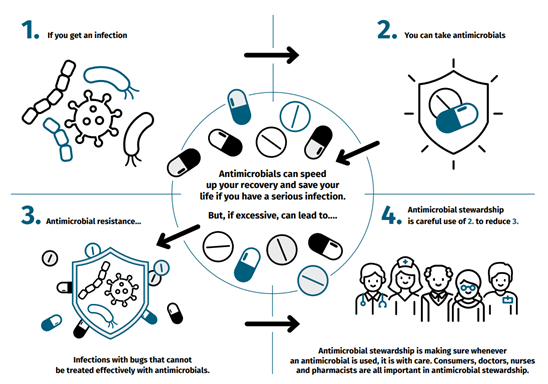
Infection -Antimicrobial Stewardship
Antimicrobial Stewardship (AMS)
Antimicrobials can speed up your recovery if you have an infection and can save your life if you have a serious infection. However, overuse of antimicrobials can lead to antimicrobial resistance – infections with bugs that cannot be treated effectively with antimicrobials.
Antimicrobial stewardship is about avoiding unnecessary use of antimicrobials and making sure that whenever an antimicrobial is used, it is used with care to minimise the risk of antimicrobial resistance.
Consumers, doctors, nurses, pharmacists and care staff all have an important role in antimicrobial stewardship.
The following information is to:
- Support conversations with both residents and families
- Provide shared understanding of careful and appropriate antibiotic use
- Signpost resources that optimise infection management in care homes
Information on
Infections, AMS and AMS Resistance

What are Infections?
- Infections are illnesses caused by bacteria, virus, fungi or parasites
- As we get older our chances of getting an infection increases
What are Antimicrobials?
Antimicrobials are medications to treat or prevent infections.
They include:
- Antibiotics which are active against bacteria (for example amoxicillin, cefalexin)
- Antivirals which are active against viruses (for example aciclovir)
- Antifungals which are active against fungi (for example clotrimazole cream)
- Antiparasitics which are active against parasites
What is Antimicrobial Resistance?
- Antimicrobial resistance (AMR) happens when bugs that cause infections become resistant to antimicrobials. AMR makes it difficult to treat the infection
- AMR rates are higher in aged care services than in hospitals
- Preventing antimicrobial misuse can reduce AMR in aged care services
What is Antimicrobial Stewardship (AMS)?
- Antimicrobial stewardship (AMS) is the careful and responsible management of medications used to treat or prevent infections
- It involves activities that promote and support best practice antimicrobial prescribing and use
Who Contributes to AMS in Aged Care Services?
- Consumers (residents, families, carers and representatives)
- Aged care providers
- Clinicians (nurses, doctors, personal care attendants)
- Pharmacists
AMS is a focus for Improvement in Aged Care Services
- Aged care residents experience higher rates of infection than other older people. They also have higher rates of antimicrobial use, compared to the general population. Residents also have multiple risk factors that may lead to developing antimicrobial resistance.
Resources to Support Best Use of Antibiotics
Antibiotic Stewardship – Care Homes and End of Life
Care Homes
We have developed guidance based on the available evidence and national consensus to support health and social care staff in managing common infections in the Care Home population.
Use of Antibiotics Towards the End of Life
SAPG convened a multi-professional group of experts in end of life care and antimicrobial stewardship to develop evidence-based good practice recommendations for clinicians considering the use of antibiotics in patients towards the end of life.
Findings from a literature review and a survey of clinicians experience were triangulated and group discussion was used to generate consensus on how to approach decision-making.
Urinary Tract Infections (UTI)
We have developed guidance based on the available evidence and national consensus to support primary care teams in managing acute and recurrent urinary tract infections. These documents have been updated to reflect the recommendations within SIGN 160 Management of suspected bacterial UTI in non-pregnant women.
- Decision aid for diagnosis and management of suspected urinary tract infection (UTI) in people aged 65 years and over (pdf)
- Care home UTI assessment tool (pdf)
- Decision aid for diagnosis and management of suspected urinary tract infection (UTI) in people with indwelling catheters (pdf)
- Management of recurrent urinary tract infection (UTI) in non-pregnant women (pdf)
- Management of urinary tract infections in men (pdf)
Skin and Soft Tissue Infections – The Scottish Ropper Ladder
The Scottish Ropper Ladder for Infected Wounds: use when wound infection is suspected
Key points are:
- Antimicrobial Wound Dressings (AWD) are indicated for the short term treatment of localised infection; and in combination with systemic antibiotics for the treatment of spreading or systemic infection.
- AWDs should not be used to heal wounds or where symptoms of infection are not present.
- Where AWDs are used, they should be reviewed after 2 weeks and should not normally be used longer than recommended by local policies or product information.














